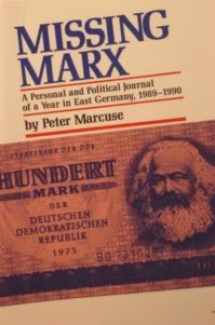
Missing Marx
ISBN-13:
9780853458289
ISBN-10:
0853458286
Edition:
English Language
Author:
Peter Marcuse
Publication date:
1991
Publisher:
Monthly Review Press
Format:
Paperback
302 pages
FREE US shipping
Book details
ISBN-13:
9780853458289
ISBN-10:
0853458286
Edition:
English Language
Author:
Peter Marcuse
Publication date:
1991
Publisher:
Monthly Review Press
Format:
Paperback
302 pages
Summary
Missing Marx (ISBN-13: 9780853458289 and ISBN-10: 0853458286), written by authors
Peter Marcuse, was published by Monthly Review Press in 1991.
With an overall rating of 3.6 stars, it's a notable title among other
books. You can easily purchase or rent Missing Marx (Paperback) from BooksRun,
along with many other new and used
books
and textbooks.
And, if you're looking to sell your copy, our current buyback offer is $0.3.
Description
Was East Germany a "Marxist" state? Some critics say that Marx was missing altogether from life in the German Democratic Republic and was sorely missed; others argue that the citizenry missed West German marks even more, and that this brought about the regimes collapse. Both criticisms miss their marks.When Peter Marcuse and his wife left for a year of teaching and research in East Germany in August 1989, they had no idea that they were about to witness one of the most tumultuous years in German history. In this remarable political and personal narrative, marcuse chronicles the course of events as the country barrelled from Karl Marx to Deutsche marks. Marcuse, born in Germany, was uniquely able to meet and talk with people at all levels of society, and his description is presented in a chronological diary of events and experiences, interspersed with short analytic essays, which together give an extraordinary inside picture of "really existing socialism" as it manifested itself in East Germany.Marcues's combination of personal diary and political analysis allows us to understand the extent to which East German society was socialist, as well as how that socialism affected people as they lived their daily lives. His discussion of how the political leadership and the dissident activists attempted first to guide and then to keep up with the rapid changes shows how the dissolution of the state was the result both of internal causes and of competition from the Western economic system. His final chapter examines what can be learned, and possibly saved, from the East German experience.


We would LOVE it if you could help us and other readers by reviewing the book
Book review

Congratulations! We have received your book review.
{user}
{createdAt}
by {truncated_author}


